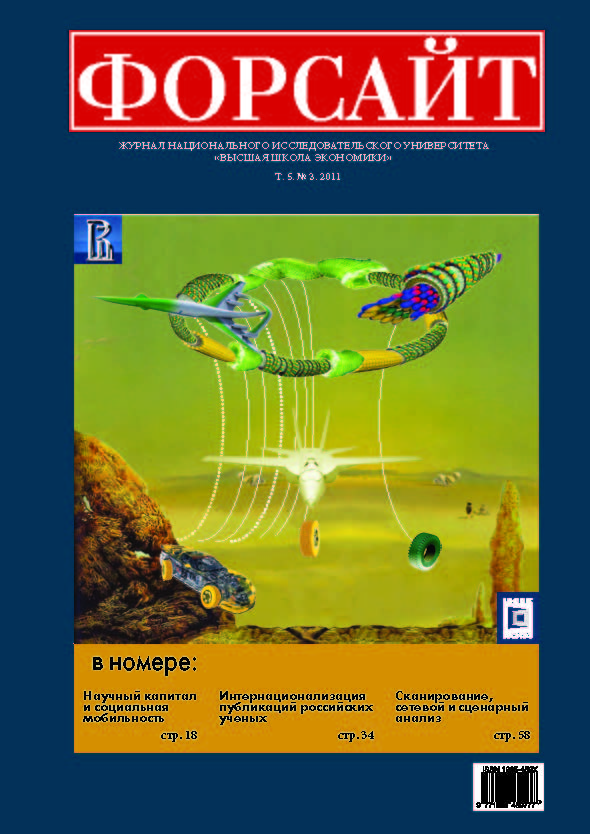Abstract
The study analyses the impact of changing patterns of globalization on the diffusion of R&D in developing countries. The main drivers of R&D globalization are multinational companies (MNCs). In early stages of globalization, these companies were hesitant to extend their R&D base in the developing world due to weak knowledge-based assets, poor infrastructure, and limited markets. The changing context of competition and necessity of enhancing their performance, however, forced large corporations to be increasingly active in involving fast-developing countries into their own R&D and innovation projects. Emerging countries previously served as suppliers of low-waged workforce for MNCs. However, in due course, some of them, especially China, India, Brazil, Singapore, have built their own S&T capacities and become new R&D and innovation hubs.
The paper distinguishes between internationalization, multinationalization and globalization. For globalization, it shows how R&D indicators for industrial enterprises, universities, and public research organizations, drawn from developed country data, can be applied for adaptation to evolution in developing countries. The paper conceptualizes the impact of R&D globalization in the following areas: the emerging international division of labour in R&D; the emerging flatter world technological regime; the multinationalization of R&D in developing country firms; the globalization of local R&D developed in firms of peripheral countries; and the off-shoring of R&D services by firms in developing countries. These formulations are based on a wide spectrum of reported empirical and secondary data from across developing countries.
Placing the impact in the theoretical framework of the new dependence school, the author concludes that center-periphery relations are also evolving, eroding the distinctiveness of the concept of periphery.
References
Cantwell J., Janne O. (1999) Technological Globalization and Innovative Centers: The Role of Corporate Technological Leadership and Locational Hierarchy // Research Policy. Vol. 28. P. 119-144.
Cantwell J., Pocatello L. (2000) The Location of Technology Activities of MNCs in European Regions: The Role of Spillovers and Local Competencies. Reading University Business School working paper. P. 1-23.
Chen Y.-C. (2007) The Upgrading of Multinational Regional Innovation Networks in China // Asia Pacific Business Review. Vol. 13. № 3. P. 373-403.
Costa I. (2005) Technological Learning, R&D and Foreign Affiliates in Brazil // Globalization of R&D and Developing Countries. New York, Geneva: UN. P. 141-154.
Costa I., Queiroz S. (2002) Foreign Direct Investment and Technological Capabilities in Brazilian Industry // Research Policy. Vol. 31. P. 143-1443.
Dunning J.H., Narula R. (1995) The R&D Activities of Foreign Firms in USA // International Studies of Management and Organization. Vol. 25. P. 39-74.
Florida R. (1997) The Globalization of R&D: Results of a Survey of Foreign Affiliated R&D Laboratories in USA // Research Policy. Vol. 26. P. 85-103.
Friedman T.L. (2006) The World Is Flat. The Globalized World in the Twenty-First Century (Updated and Expanded). Penguin Books.
Galina S.V.R., Polnski G.A. (2002) Global Product Development in the Telecommunication Industry: An Analysis of the Brazilian Subsidiaries Involvement. Paper presented at 9th International Product Development Conference, Sophia-Antipolis, France, May. European Institute for Advanced Studies in Management (EIASM). P. 12-13. http://www.fia.com.br/pgtusp/pesquisas/orq_prorex/subol/SGalina%20%209th%20IPDMC.pdf.
Kuemmerle W. (1997) Building Effective R&D Capabilities Abroad // Harvard Business Review. March-April. P. 61-70.
Kuemmerle W. (1999) Foreign Direct Investment in Industrial Research in the Pharmaceutical and Electronic Industries: Results from a Survey of Multinational Firms // Research Policy. Vol. 28. P. 179-193.
Le Bas C., Sierra C. (2002) Location versus Country Advantages in R&D Activities: Some Further Results on Multinational's Locational Strategies // Research Policy. Vol. 31. P. 589-690.
Patel P. (1995) Localized Production of Technology for Global Markets // Cambridge Journal of Economics. Vol. 19. P. 141-153.
Pattnaik B.K. (2005) Impact of Globalization on the Technological Regime in India: Aspects of Change // Perspectives in Global Development and Technology. Vol. 4. № 1. P. 63-82.
Pearce R. (2005) The Globalization of R&D: Key Features and the Role of TNCs // Globalization of R&D and Developing Countries. New York, Geneva: UN. P. 29-42.
Pearce R., Singh S. (1990) Internationalization of R&D Among the World's Leading Enterprises: Survey Analysis, Motivation, Organization and Implications. Paper presented at the Conference on Technology Management and International Business, Stockholm, June 17-20.
Petrella R. (1992) Internationalization, Multinationalization and Globalization of R&D: Toward a new Division of Labour in Science and Technology // Knowledge and Policy: The International Journal of Knowledge Transfer and Utilization. Vol. 5. № 3. P. 3-25.
Queiroz S., Zanatta M., Andrade C. (2003) Internationalization of MNCs' Technological Activities: What Role for Brazilian Subsidiaries? Paper presented at SPRU conference in the honor of Keith Pavitt, Brighton, November. P. 13-15. www.sussex.ac.uk/units/spru/events/kp_conf_03/ documents/Queiroz.pdf.
Saxenian A.L. (2002) The Silicon Valley Connection: Transnational Networks and Regional Development in Taiwan, China and India // Science, Technology and Society. Vol. 7. № 1. P. 117-149.
Simon D.F. (2007) Wither Foreign R&D in China: Some Concluding Thoughts on Chinese Innovation // Asia Pacific Business Review. Vol. 13. № 3. P. 471-480.
UNCTAD Secretariat (2005) An Overview of the Issues // Globalization of R&D and Developing Countries. New York, Geneva: UN. P. 1-25.
Upadhya C. (2004) A New Transnational Capitalist Class? Capital Flows, Business Networks and Entrepreneurs in the Indian Software Industry // Economic and Political Weekly. Vol. 39. № 48 (November 27-December 3). P. 5141-5151.
Von Zedtwitz M. (2005) International R&D Strategies of TNCs from Developing Countries. The Case of China // Globalization of R&D and Developing Countries. New York, Geneva: UN. P. 117-140.
Wallerstein I. (1991) Geopolitics and Geoculture: Essays on the Changing World-System. Cambridge: Cambridge University Press.
Wallerstein I. (2004) World-Systems Analysis: An Introduction. Durham, North Carolina: Duke University Press.
Warrant F. (1991) Deploiment Mondial de la R&D Industriells. FAST research paper. April. Brussels: Commission of the European Communities.
Wong B.P. (2006) The Chinese in Silicon Valley: Globalization, Social Networks, and Ethnic Identity. Lanham: Rowman & Littlefield Publishers.
Yurevich A.V. (2010) Globalization Process in Contemporary Science and Scholarship in Russia // Asheulova N. et al. (eds.) Liberalizing Research in Science and Technology: Studies in Science Policy. Saint Petersburg: Saint Petersburg Politechnika Press. P. 94-105.

This work is licensed under a Creative Commons Attribution 4.0 International License.

